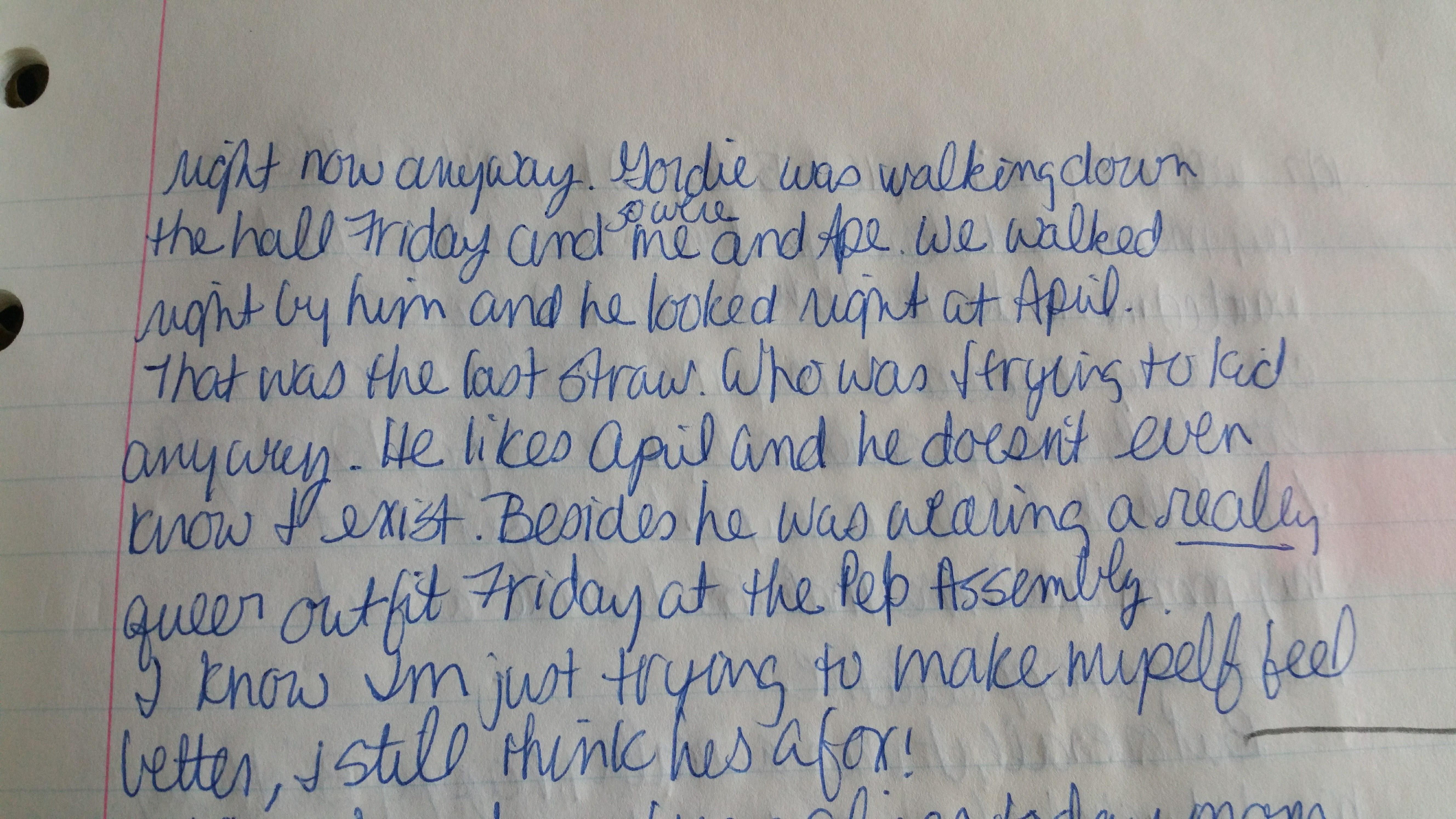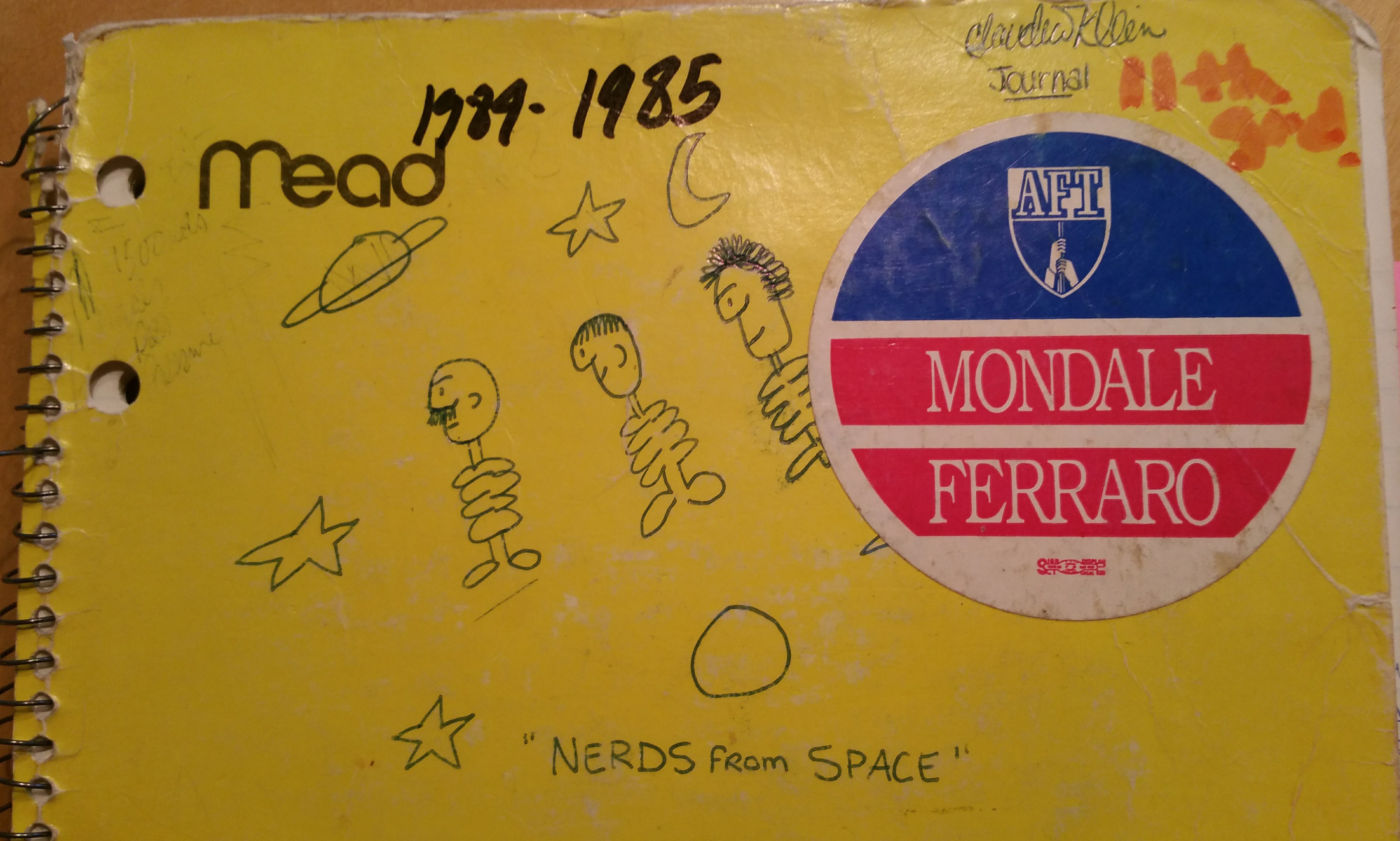These were not the “Dear Diary” scrawlings of an eight-year-old in a sparkly pink journal, secured by an adorably tiny lock. This was pure teen angst, an unfiltered look at my high school hangups.
My 15-year old self would have been mortified! In fact, one of my journal entries (November 13, 1985) confirms it: “I TOTALLY FREAKED OUT YESTERDAY!!! I thought this journal was gone! I would totally die if this got out!”
So why, 31 years later, did I (“totally”) betray the confidence of my 15-year-old self? And what legitimate place, you may be wondering, does any of this have in my classroom?
Okay, fair question. My objective that day was to introduce my students to podcasting, as  eventually they’ll be recording their own podcasts. And since it was Homecoming week, the plan was to play for them Homecoming Ruined My Life, an episode detailing "The Esoteric Secrets of Adam Ruben” - an entertaining look at the awkward inner and outer life of a high schooler trying to get a date to Homecoming. It was an episode from Mortified, a podcast in which adults share “their most mortifying childhood artifacts (diaries, letters, lyrics, poems, home movies)… in front of total strangers.”
eventually they’ll be recording their own podcasts. And since it was Homecoming week, the plan was to play for them Homecoming Ruined My Life, an episode detailing "The Esoteric Secrets of Adam Ruben” - an entertaining look at the awkward inner and outer life of a high schooler trying to get a date to Homecoming. It was an episode from Mortified, a podcast in which adults share “their most mortifying childhood artifacts (diaries, letters, lyrics, poems, home movies)… in front of total strangers.”
 eventually they’ll be recording their own podcasts. And since it was Homecoming week, the plan was to play for them Homecoming Ruined My Life, an episode detailing "The Esoteric Secrets of Adam Ruben” - an entertaining look at the awkward inner and outer life of a high schooler trying to get a date to Homecoming. It was an episode from Mortified, a podcast in which adults share “their most mortifying childhood artifacts (diaries, letters, lyrics, poems, home movies)… in front of total strangers.”
eventually they’ll be recording their own podcasts. And since it was Homecoming week, the plan was to play for them Homecoming Ruined My Life, an episode detailing "The Esoteric Secrets of Adam Ruben” - an entertaining look at the awkward inner and outer life of a high schooler trying to get a date to Homecoming. It was an episode from Mortified, a podcast in which adults share “their most mortifying childhood artifacts (diaries, letters, lyrics, poems, home movies)… in front of total strangers.”
This episode would, I reasoned, serve both as an introduction to podcasting and a direct tie to their lives (a sort of “It gets better” reminder to students on this Homecoming week, a week filled with excitement, rejection, angst, and the whole roller coaster in between).
Duly inspired by Adam Ruben’s confessional, the night before class, I journeyed through some of my own high school journals, earmarking the passages relating to Gordie, my high school crush, and my homecoming disappointments.
And so, in Freshman English, before Adam Ruben read from “The Esoteric Secrets of Adam Ruben,” I read to them from mine:

I recited to my Freshmen confessions of my crush on Gordie, stress over homework and grades, my unhealthy fixation on losing 5 more pounds. As I did, I felt as vulnerable and sophomoric as I did back in 1985, and yes, a bit mortified. A classful of adolescent eyes were raptly fixed on me. There was a palpable mix of curiosity, surprise, and empathy in the air.
Why the intensity? Why were students glued, eyes and ears?
It turns out the private moments of teenage me were universal moments to my students decades later. The word is authenticity.
To learn from us, students first need to see us as real people. When I read from my childhood journal, my students saw me as a real person who was once a self-conscious, conflicted, complicated teenager, not unlike themselves.
As an English teacher, I want words to do for my students what, looking back, they've done for me. I want my students to use words to express themselves, to relate to others, to feel less alone, maybe even to read years from now, as adults looking back with a more gentle understanding of their younger selves and a greater empathy for the teens in their own lives.
Not until my 24th year of teaching did I read my journal aloud in class---perhaps it required precisely that much time and distance for me to be comfortable doing so. What I do know is that taking that risk and stepping into that potentially mortifying moment, childhood journal in-hand, will now be another tool in my teaching repertoire.
Teacher take-aways?
 If you have a childhood journal or assignment from when you were in school that you can relate to what your teaching, use it!
If you have a childhood journal or assignment from when you were in school that you can relate to what your teaching, use it! - It’s tricky to mix the private and the personal in your classroom, but if bring your teenage vulnerabilities into the classroom, your students will respect you for it.
- Podcasts are an untapped goldmine for our classrooms across the curriculum. (More on that, I suspect, in a future blogpost).

No comments:
Post a Comment